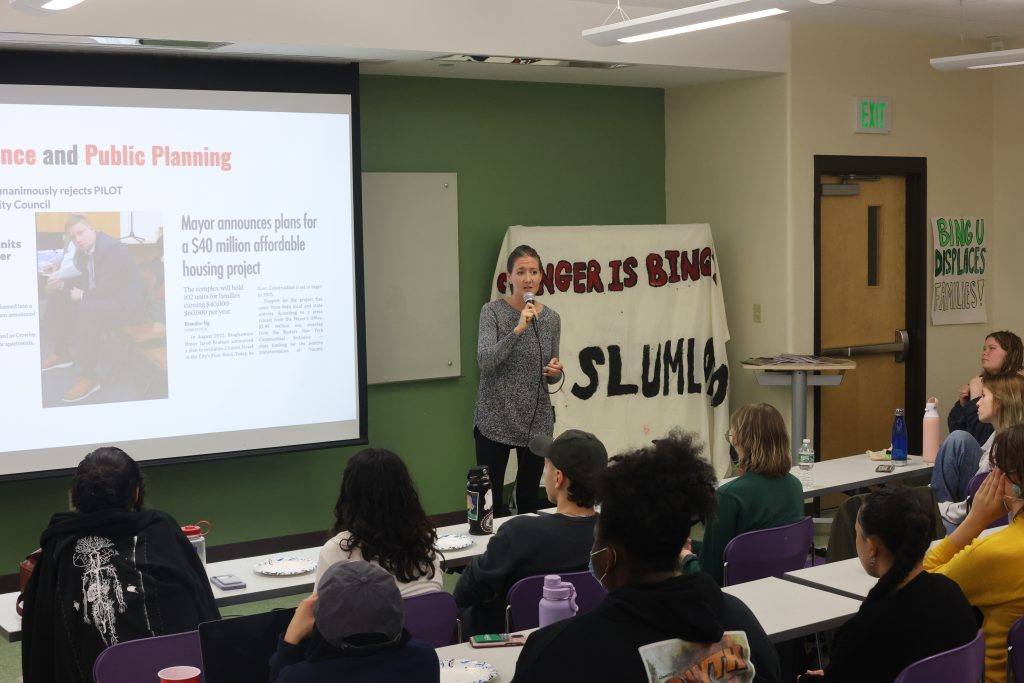
The Stakeholders of Broome County cohosted the third-annual Housing Summit Thursday at Binghamton University to discuss the housing crisis in Broome County.
Also leading the summit were the BU chapter of the New York Public Interest Research Group (NYPIRG) and the UniverCity Tenants Union (UTU) — “hardline advocates for housing justice in the Binghamton community and for [BU] students.” They addressed the severity of the local housing crisis and the University’s role in the issue. Some topics of discussion included the plethora of profit-driven actions by landlords, a growing displacement of Binghamton residents for increased student housing and a lack of funding for housing initiatives by local officials.
The Stakeholders of Broome County, an independent organization of community volunteers focused on serving those affected by the housing crisis, provide legal resources to those in disputes with landlords, collect and distribute supplies for those directly impacted and hold events to raise awareness in the community.
Raissa Bellucci, vice president of the local NYPIRG chapter and a junior majoring in classical studies, described the University’s role in Binghamton’s housing crisis.
“By attending the University, students help in creating raised rent prices in the local area because landlords know they are willing to pay more expensive prices for housing,” Bellucci wrote in an email. “Unfortunately, many people who reside in Binghamton cannot pay these prices. The University could help in a multitude of ways, such as donating back to the community or even working to make certain housing areas closed to full-time Binghamton residents to make it easier.”
The UTU presented first, explaining BU’s role in the county’s housing crisis, including a lack of affordable housing for students, over-enrollment in recent years and a lack of commitment by the University toward housing justice. After, the Stakeholders of Broome County spoke on the causes and effects of the housing crisis on the community. Much of the discussion was focused on the lack of funding — or the misplacement of funds — by local officials relative to the housing crisis. The presentation also included an extensive look at recent statistics on the displacement of local residents, the number of residents in emergency shelters and unsheltered residents forced to live on the streets. One statistic related to the pressing lack of affordable housing shows that a plurality of renters surveyed in Broome County — 26 percent — have rent payments that take up more than 50 percent of their household income.
Jacob Weber, a UTU member and a junior majoring in philosophy, politics and law, addressed the struggle for residents to consistently find shelter and the work being done to assist them.
“We’re trying to help mitigate the homelessness problem as much as possible,” Weber said. “We talked about outreach at the housing summit, where we physically gather supplies to hand out to the homeless in Binghamton. It’s literally lifesaving for people.”
After both groups presented on issues facing the community, students broke off into three groups to more directly discuss some of the topics. A common theme was a call to action for students to get directly involved with the effort to curb the housing crisis, through volunteer work to assist those unable to find stable homes, assisting local organizations or getting involved with local politics.
Stephen Corbisiero, a senior double-majoring in environmental studies and geography, discussed the necessary steps to prevent further expansion of the housing issue.
“When it comes to the housing crisis, the University is not really thinking about the impact it has on the local community,” Corbisiero said. “I think the University cannot just be a school, but it has to be a community hub where the local residents and economy are supported.”
The event concluded with a final call to action by the Stakeholders of Broome County asking students in attendance to get involved with the issue by taking direct action and getting on the ground to support the cause. Afterward, some students stayed to speak with present organizations about getting involved.
Weber noted the importance of taking action, calling for students to work toward curbing the progression of the housing crisis.
“This is a call to action,” Weber said. “If you have been affected by the housing crisis, we need people power on the streets helping to hand things out to the homeless. It’s absolutely crucial that we try to fill in the gaps that the University and the City Council are deliberately leaving.”


